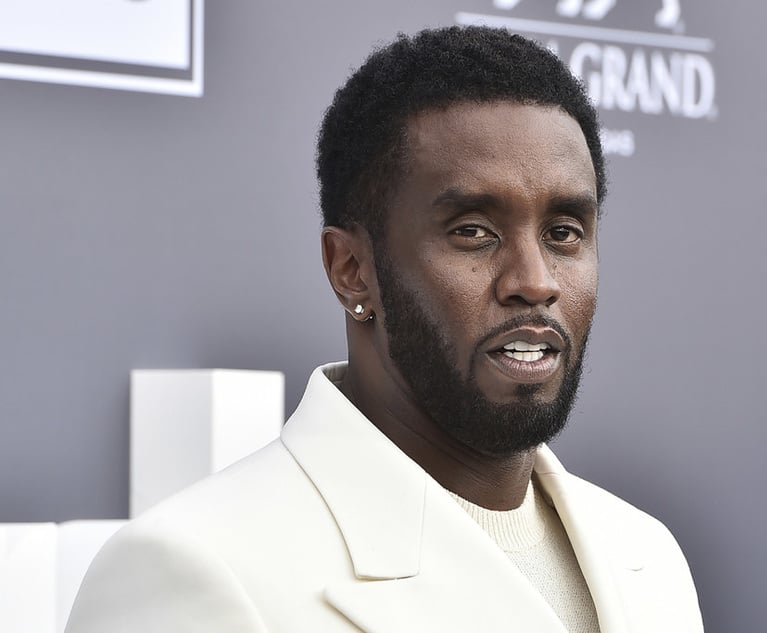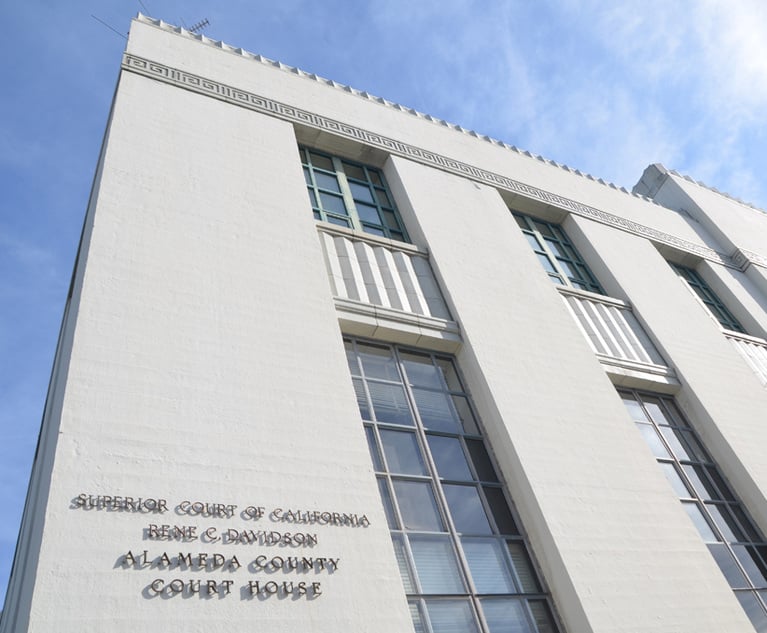Confirming Criminal Probe, John Eastman Says Federal Agents Seized His iPhone Last Week
Eastman's lawyers on Monday filed an emergency motion in U.S. district court seeking the phone's return.
June 27, 2022 at 08:54 PM
4 minute read
 John Eastman signs a hat won by a supporter during a live auction at the California Republican Assembly convention at the Knott's Berry Farm Hotel in Buena Park, California, on Saturday, March 19, 2022. Photo: Meghann M. Cuniff/ALM
John Eastman signs a hat won by a supporter during a live auction at the California Republican Assembly convention at the Knott's Berry Farm Hotel in Buena Park, California, on Saturday, March 19, 2022. Photo: Meghann M. Cuniff/ALM
Federal agents seized John Eastman's cellphone under a search warrant served outside a New Mexico restaurant last week, according to a motion Eastman's lawyers filed Sunday seeking its return.
The motion includes a copy of the six-page warrant that authorized the seizure of any electronic devices and all information on them during a search of "the person of John Eastman and the area within his immediate control."
The warrant references a supporting affidavit, but none is included in the filing and Eastman's lawyers said he was not provided one. The warrant was signed June 17 by U.S. Magistrate Judge Laura Fashing, with the search and seizure authorized between 6 a.m. and 10 p.m. on or before July 1.
Eastman's motion says it was served "the evening of June 22″ as Eastman exited a restaurant. Agents first refused to show him the warrant when he asked, and they frisked him and seized his iPhone Pro 12, according to the motion, which also says Eastman "was forced to provide biometric data to open said phone." He was then given a copy of the warrant but not the affidavit, his lawyers said.
"The warrant mentions no crime at all, much less any specific crime, and even if the specifics necessary to support a finding of probable cause related to a specific crime are contained in the supporting affidavit, the affidavit was not attached to the warrant and therefore cannot serve to cure the warrant's facial defect on this score," according to Monday's 13-page emergency motion, signed by Charles Burnham of Burnham & Gorokhov in Washington, D.C., and Joseph Gribble of Crowley & Gribble in Albuquerque, New Mexico.
The motion wants a judge to order the return of Eastman's phone as well as "all information" in it, and to order the destruction of "all copies of any information that has already been retrieved or copied from the device." It also wants all access to the phone and its information to be halted "until he has a full and fair opportunity to assert and protect his Constitutional rights and the privileged communications of his numerous clients."
The motion is the first confirmation of a criminal investigation into Eastman, who was a lead lawyer for President Donald Trump's post-election legal challenges and been accused of likely criminal behavior by both the Jan. 6 Committee and U.S. District Judge David O. Carter of the Central District of California.
With the Committee's pubic hearings now underway, Carter's finding about Eastman and Trump's "more likely than not" committing obstruction of an official proceeding and conspiracy to defraud the United States has drawn heightened attention, as has the judge's call for action in his March 28 order.
But Eastman's filing on Monday continues an aggressive stance he's taken against the committee's investigation and Carter's determination that the crime-fraud exception can be applied to otherwise privileged Eastman emails. It also invokes the privilege claims that led to Carter halting Chapman University—where Eastman was a law professor—from disclosing Eastman's emails to the committee in January.
While the judge ultimately made highly publicized rulings against Eastman, he also oversaw a nearly five-month review of the emails that resulted in many being withheld from the committee because of attorney-client or work product privileges. That incudes 10 that were reclassified following Carter's June 7 order after Eastman pointed out errors in the analysis.
And though he ruled the crime-fraud exception applied to two otherwise privileged documents, Carter repeatedly recognized Eastman's rights as an attorney during the litigation.
Now Eastman is citing that process in his new filing in the District of New Mexico, with his lawyers writing that the court "expressly determined that a number of movant's emails—emails which are accessible through movant's cell phone—are protected by the First Amendment's freedom of association, by attorney-client privilege, and/or by the work product doctrine."
"The California district court also found that hundreds of movant's emails—also accessible by the seized phone—are protected by attorney-client privilege and/or the work product doctrine," according to the motion.
The U.S. Department of Justice has not yet replied to the motion.
This content has been archived. It is available through our partners, LexisNexis® and Bloomberg Law.
To view this content, please continue to their sites.
Not a Lexis Subscriber?
Subscribe Now
Not a Bloomberg Law Subscriber?
Subscribe Now
NOT FOR REPRINT
© 2025 ALM Global, LLC, All Rights Reserved. Request academic re-use from www.copyright.com. All other uses, submit a request to [email protected]. For more information visit Asset & Logo Licensing.
You Might Like
View All
Two More Victims Alleged in New Sean Combs Sex Trafficking Indictment


'It's a Matter of Life and Death:' Ailing Harvey Weinstein Urges Judge to Move Up Retrial

Invoking Trump, AG Bonta Reminds Lawyers of Duties to Noncitizens in Plea Dealing
4 minute readTrending Stories
- 1Parties’ Reservation of Rights Defeats Attempt to Enforce Settlement in Principle
- 2ACC CLO Survey Waves Warning Flags for Boards
- 3States Accuse Trump of Thwarting Court's Funding Restoration Order
- 4Microsoft Becomes Latest Tech Company to Face Claims of Stealing Marketing Commissions From Influencers
- 5Coral Gables Attorney Busted for Stalking Lawyer
Who Got The Work
J. Brugh Lower of Gibbons has entered an appearance for industrial equipment supplier Devco Corporation in a pending trademark infringement lawsuit. The suit, accusing the defendant of selling knock-off Graco products, was filed Dec. 18 in New Jersey District Court by Rivkin Radler on behalf of Graco Inc. and Graco Minnesota. The case, assigned to U.S. District Judge Zahid N. Quraishi, is 3:24-cv-11294, Graco Inc. et al v. Devco Corporation.
Who Got The Work
Rebecca Maller-Stein and Kent A. Yalowitz of Arnold & Porter Kaye Scholer have entered their appearances for Hanaco Venture Capital and its executives, Lior Prosor and David Frankel, in a pending securities lawsuit. The action, filed on Dec. 24 in New York Southern District Court by Zell, Aron & Co. on behalf of Goldeneye Advisors, accuses the defendants of negligently and fraudulently managing the plaintiff's $1 million investment. The case, assigned to U.S. District Judge Vernon S. Broderick, is 1:24-cv-09918, Goldeneye Advisors, LLC v. Hanaco Venture Capital, Ltd. et al.
Who Got The Work
Attorneys from A&O Shearman has stepped in as defense counsel for Toronto-Dominion Bank and other defendants in a pending securities class action. The suit, filed Dec. 11 in New York Southern District Court by Bleichmar Fonti & Auld, accuses the defendants of concealing the bank's 'pervasive' deficiencies in regards to its compliance with the Bank Secrecy Act and the quality of its anti-money laundering controls. The case, assigned to U.S. District Judge Arun Subramanian, is 1:24-cv-09445, Gonzalez v. The Toronto-Dominion Bank et al.
Who Got The Work
Crown Castle International, a Pennsylvania company providing shared communications infrastructure, has turned to Luke D. Wolf of Gordon Rees Scully Mansukhani to fend off a pending breach-of-contract lawsuit. The court action, filed Nov. 25 in Michigan Eastern District Court by Hooper Hathaway PC on behalf of The Town Residences LLC, accuses Crown Castle of failing to transfer approximately $30,000 in utility payments from T-Mobile in breach of a roof-top lease and assignment agreement. The case, assigned to U.S. District Judge Susan K. Declercq, is 2:24-cv-13131, The Town Residences LLC v. T-Mobile US, Inc. et al.
Who Got The Work
Wilfred P. Coronato and Daniel M. Schwartz of McCarter & English have stepped in as defense counsel to Electrolux Home Products Inc. in a pending product liability lawsuit. The court action, filed Nov. 26 in New York Eastern District Court by Poulos Lopiccolo PC and Nagel Rice LLP on behalf of David Stern, alleges that the defendant's refrigerators’ drawers and shelving repeatedly break and fall apart within months after purchase. The case, assigned to U.S. District Judge Joan M. Azrack, is 2:24-cv-08204, Stern v. Electrolux Home Products, Inc.
Featured Firms
Law Offices of Gary Martin Hays & Associates, P.C.
(470) 294-1674
Law Offices of Mark E. Salomone
(857) 444-6468
Smith & Hassler
(713) 739-1250






